|
|
|
Sort Order |
|
|
|
Items / Page
|
|
|
|
|
|
|
| Srl | Item |
| 1 |
ID:
132229
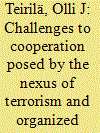

|
|
|
|
|
| Publication |
2014.
|
| Summary/Abstract |
The recent conflict in the Sahel area is another case where the nexus of terrorism and organized crime causes challenges to the international community. Comparing the situation with that of the Andean region brings forth the challenges faced when dealing with this type of conflict: the states' weak presence in the remote regions, the insurgents' ability to offer income and "security" to the people, immediate threat to international investments, unresolved political/regional issues, the marriage of convenience of insurgents/terrorists and organized crime, internal divisions of the insurgent groups and also ideologies surviving or suffering after the elimination of their leaders
|
|
|
|
|
|
|
|
|
|
|
|
|
|
|
|
| 2 |
ID:
129261
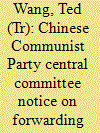

|
|
|
|
|
| Publication |
2012.
|
| Summary/Abstract |
To the Xinjiang Autonomous Region Party Committee and the party committees of all provinces, municipalities, and autonomous regions; the party committees of all large military districts, provincial military districts, and field armies; all central ministries and commissions; the party committees of various ministries and commissions of state organs; all general headquarters of military commissions; the party committees of all services of the armed forces; and the party committees of all people'sorganizations:The "Central Secretariat Summary of Discussions on Work Issues inXinjiang"1is hereby issued to you. Please implement it and carry it out in connection with actual circumstances. This document is simultaneously issued to the Party committees of all provinces, municipalities, and autonomous regions for reference. On the morning of July 6, 1981, issues in the work in Xinjiang were once again discussed in accordance with the Resolutions on a Number of Historical Questions in the Party since the Founding of the People's Republic passed by the Sixth Plenary Session of the Eleventh Party
|
|
|
|
|
|
|
|
|
|
|
|
|
|
|
|
| 3 |
ID:
126913
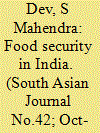

|
|
|
| 4 |
ID:
083264
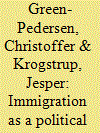

|
|
|
|
|
| Publication |
2008.
|
| Summary/Abstract |
Abstract. Studies of party politics and party competition in West European democracies all point to diversification. Non-economic issues such as the environment, refugees and immigrants or law and order have become increasingly central to party politics. However, there has been surprisingly little interest in explaining variation across time and countries concerning which issues actually become central to party competition. From the sparse literature, two general answers can be discerned. One is societal, focusing on mass media coverage, public opinion and the development of the policy problems related to the issue. The other focuses on the structure of party competition itself - more precisely on the incentives for different parties in drawing attention to different issues. This study stresses the importance of the latter based on a study of the immigration issue in Denmark and Sweden. Party political attention to this issue in the 1990s has been considerably stronger in Denmark than in Sweden. This can be explained by the different strategic situation of the main stream right-wing parties in the two countries. Focusing on the immigrant issue easily leads to a conflict with the centre-right, especially social liberal parties. In Sweden, such a conflict would undermine mainstream right-wing attempts at winning government power. In Denmark, the Social Liberals governed with the Social Democrats in the 1990s, which made it attractive for the main stream right-wing parties to focus on the issue in order to win government power based on the support of radical right-wing parties
|
|
|
|
|
|
|
|
|
|
|
|
|
|
|
|
| 5 |
ID:
126861
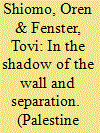

|
|
|
|
|
| Publication |
2011.
|
| Summary/Abstract |
The article presents the author's views concerning the political issues on the separation wall in Jerusalem. The author denotes the implementation of borders within East Jerusalem through separation wall by Israeli government. The author mentions the government's aim for globalization. Furthermore, the author also cites the closure of Jerusalem from West Bank
|
|
|
|
|
|
|
|
|
|
|
|
|
|
|
|
| 6 |
ID:
126145
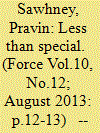

|
|
|
|
|
| Publication |
2013.
|
| Summary/Abstract |
Special Forces (SF) in India have an existential dilemma. On the one hand the absolute defensive approach of the government to national security makes SF unnecessary. On the other hand senior military commanders rarely understand that special operations are qualitatively different from regular warfare, not a sub-category of it. Talks, therefore, of raising SF command is putting the cart before the horse. The need is to first resolve the fundamental issues at the political and military levels.
|
|
|
|
|
|
|
|
|
|
|
|
|
|
|
|
| 7 |
ID:
129262


|
|
|
|
|
| Publication |
2012.
|
| Summary/Abstract |
To the Government of the Xinjiang Autonomous Region: The Summary of Discussions on the Work of Opening Up Xinjiang has been perused and approved by Comrade Gu Mu. In line with the opinions of leading comrades, it is hereby printed and issued to you. Please study it and carry it out. Ever since the third plenary session of the eleventh party congress, Xinjiang has been politically stable and united and economic construction has developed rapidly. The industrial and agricultural gross output value of 1986 has more than doubled that of 1980. Agriculture and animal husbandry have had bumper harvests for ten consecutive years, and the region is more than self-sufficient in cereals, cotton, oil, and sugar crops. Import trade, use of foreign currency, and the tourist business have made significant progress. Airline and railway communications and transport conditions have seen constant improvement. Xinjiang has abundant resources and a vast, sparsely populated territory and has great potential for developing the economy and supporting national construction.
|
|
|
|
|
|
|
|
|
|
|
|
|
|
|
|
| 8 |
ID:
090679
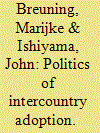

|
|
|
|
|
| Publication |
2009.
|
| Summary/Abstract |
What determines whether a country has more or less restrictive policies regarding intercountry adoption? Despite the growing importance of intercountry adoption as a political issue, and as an explicitly human face of globalization, there is virtually no systematic empirical work on intercountry adoption. We introduce a measure of the restrictiveness of the adoption laws in Sub-Saharan African countries and test possible explanations for the variations in legal restrictions on intercountry adoption among these countries.
Factors that are commonly cited as explanations for the restrictiveness of intercountry adoption policies do not hold up very well in our assessment. Openness to adoption is not determined by the severity of the orphan crisis or the AIDS crisis within the sending country, nor are democratic countries more responsive to the needs of their orphans. Additionally, African signatories to the Hague Convention, which aimed to increase transparency and accountability in intercountry adoption, tend to be among the most restrictive. On the other hand, a stronger connection with the global economy is associated with greater openness to intercountry adoption. We conclude with a discussion of the implications for orphans and for intercountry adoption.
|
|
|
|
|
|
|
|
|
|
|
|
|
|
|
|
|
|
|
|
|